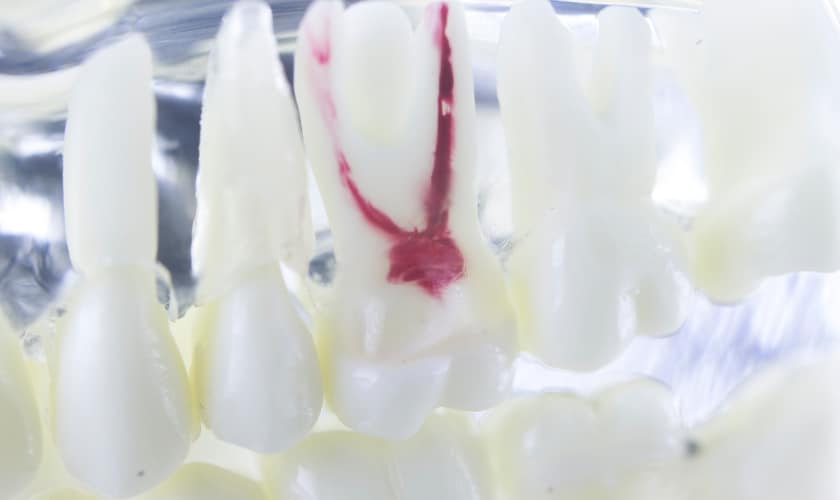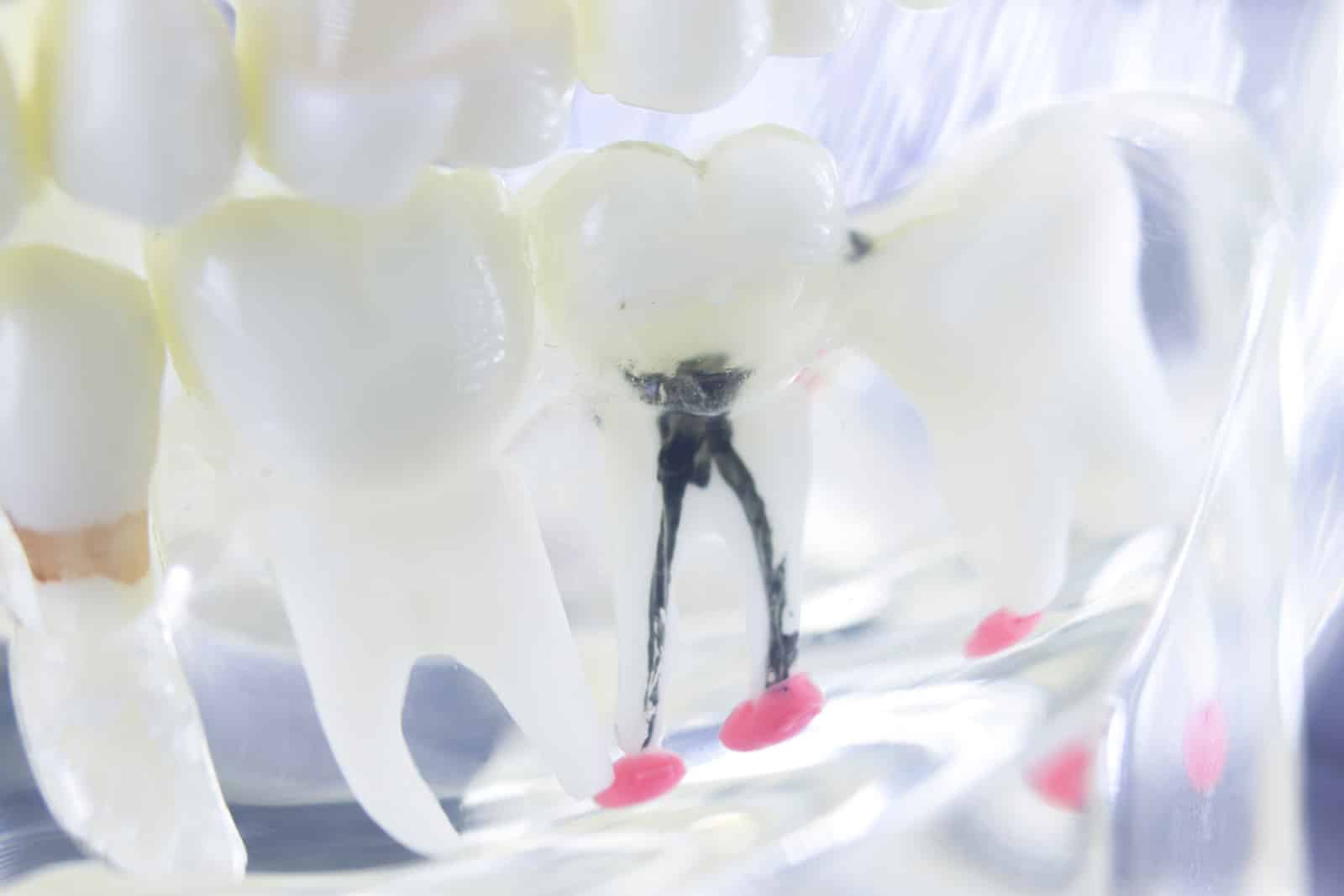Request An Appointment

A Complete Guide To Kids Root Canals

A Complete Guide To Kids Root Canals
Root canals are a common dental procedure, particularly for children. They are usually performed when the tooth’s nerve is damaged or infected. The nerve is located in the root canal, which is the space inside the tooth’s root. Root canals are typically performed by an endodontist, a dentist who specializes in this type of procedure.
What is a Root Canal?
A root canal is a treatment used to save a tooth that is badly decayed or infected. The procedure involves removing the damaged tissue from inside the tooth, cleaning and disinfecting the area, and then filling and sealing the tooth. Root canals are usually performed by dentists or endodontists (specialists who treat problems with the teeth).
The most common reason for a child to need a root canal is if they have a deep cavity that has reached the pulp (the soft tissue inside the tooth that contains blood vessels and nerves). If the pulp becomes infected, it can cause pain, swelling, and even damage to the surrounding teeth. A root canal can remove the infection and save the tooth.
Root canals are usually not painful, but your child may feel some discomfort during the procedure. The dentist will numb the area before starting the procedure. Afterward, your child may need to take over-the-counter pain medication for a few days. Most children recover quickly from a root canal and can return to their normal activities within a few days.
Why Do Kids Need Root Canals Treatments?
Root canals are a common dental procedure, but many parents don’t know much about them. Here’s what you need to know about root canals for kids.
There are a few reasons why your child might need a root canal. The most common reason is that they have a tooth that is severely decayed or infected. In some cases, the tooth may be so damaged that it needs to be removed. However, if the tooth can be saved, a root canal will be performed.
Other reasons your child may need a root canal include trauma or injury to the tooth, such as a cracked or broken tooth. In some cases, the root of the tooth may become exposed due to gum disease which can lead to infection.
Root canals have been used for many years and are relatively safe. It is an outpatient procedure so children won’t need to be hospitalized. A local anesthetic is used during the procedure and then a dental specialist will remove any infected tissue in the area of the root canal. The inside of the tooth is then sealed off with an artificial material such as gutta-percha and sealed with cement.
A crown may also be placed over the treated tooth to prevent it from breaking in the future and help restore its natural shape and appearance. Following treatment, it’s important that your child maintains good oral hygiene habits, including brushing and flossing regularly. This will help keep their teeth healthy and decrease their risk of needing another root canal in the future.
How Does the Procedure Work?
A root canal is a treatment used to save a tooth that is badly decayed or infected. The procedure involves removing the damaged tissue from inside the tooth, cleaning and disinfecting it, and then filling it with a special material. Root canals are usually done in one or two visits to the dentist.
During the first visit, the dentist will numb your child’s tooth and gums with local anesthesia. Then, a small hole will be drilled into the tooth so that the dentist can access the inside of it. Using special instruments, the dentist will remove the damaged tissue and clean out the inside of the tooth. Once this is done, the tooth will be filled with a special material called gutta-percha. A temporary filling will be placed over the hole in the tooth until your child’s next appointment.
At the second appointment, the temporary filling will be removed and replaced with a permanent filling or crown. Your child may feel some discomfort during this procedure, but it should go away within a few days. It’s important to have your child brush and floss regularly to avoid any further problems with their teeth.
Is It Safe for Kids to Have Root Canals?
When it comes to root canals, there is a lot of misinformation out there. Some people believe that root canals are painful, while others think that they are dangerous. However, the truth is that root canals are safe for both adults and children. In fact, they are often the best option for treating an infected tooth.
Root canals are not painful. The procedure is actually very similar to getting a filling. In most cases, the only discomfort comes from the injection of anesthesia. Once the anesthesia takes effect, you should not feel any pain during the procedure.
Root canals are also very safe. The procedure has a success rate of over 95%. Complications from root canals are rare, and most people experience no problems after the procedure.
If your child has an infected tooth, don’t hesitate to talk to your dentist about a root canal. It is the best way to treat the infection and save the tooth.
What Are the Benefits of Having a Root Canal Treatment?
Although a root canal treatment may sound daunting, it is actually a relatively simple procedure that can save your child’s tooth. Root canals are necessary when the pulp, or soft tissue inside the tooth, becomes infected or damaged. This can happen due to decay, an injury, or other trauma to the tooth.
A root canal treatment involves removing the damaged pulp from the inside of the tooth and sealing it off to prevent further infection. Although this may sound like it would be painful, most children report little to no discomfort during or after the procedure. In fact, many say that having a root canal is no more uncomfortable than having a filling placed.
The benefits of having a root canal treatment outweigh any potential discomfort. The procedure will save your child’s tooth so that they can continue to eat and speak normally. Additionally, it will help to prevent further infection which could lead to more serious health problems down the road.
Aftercare And Recovery Tips For Kids Root Canals
When your child has a root canal, it is important to follow the aftercare instructions given to you by the dentist. These will help to ensure that the area heals properly and that your child does not experience any complications. Here are some tips for aftercare and recovery:
– Have your child take it easy for the rest of the day. Avoid strenuous activity or play.
– Apply a cold compress to the outside of the mouth for 10-15 minutes at a time to help with pain and swelling.
– Give your child over-the-counter pain medication as needed for discomfort.
– Have your child eat soft foods for the next few days. Avoid hard or crunchy foods that could irritate the area.
– Keep an eye on the area for any signs of infection, such as redness, swelling, or discharge. If you notice any of these, call the dentist right away.
What Are Some Tips for Parents Helping Their Child Through the Process?
As a parent, it can be difficult to watch your child go through any type of medical procedure. But if your child needs a root canal, there are some things you can do to help them through the process.
First, it’s important to explain to your child what a root canal is and why they may need one. Kids can be scared of going to the dentist, so it’s important to make them feel as comfortable as possible. You can also tell them that it’s nothing to be afraid of and that the dentist will take good care of them.
Once you’re at the dentist’s office, make sure you stay calm and relaxed. This will help your child feel more at ease. If your child is still feeling anxious, the dentist may be able to give them a mild sedative to help them relax.
During the procedure, you may want to hold your child’s hand or have them squeeze a stress ball if they’re old enough. It’s also important to let the dentist know if your child is in pain so they can adjust the level of anesthesia accordingly.
After the root canal is finished, it’s normal for your child to feel some discomfort for a few days. Give them over-the-counter pain medication as needed and make sure they get plenty of rest. In most cases, kids make a full recovery and can go back to their normal activities within a few days.
Finally, talk to your child about the experience and make sure they feel comfortable talking about it. If they have any questions or concerns, listen to them and answer them in a gentle way. Letting your kids know that you’re there for them can help reduce their fear and anxiety about root canals.
Conclusion
Root canals are a safe and effective way to treat children’s dental issues. They provide relief from pain, save teeth and help prevent further damage. With the proper care and attention, root canals can be a successful treatment for kids of all ages. If your child is experiencing tooth pain or has been diagnosed with an abscessed tooth, talk to your dentist about getting a root canal as soon as possible. It may be just what they need to keep their smile healthy for years to come!







